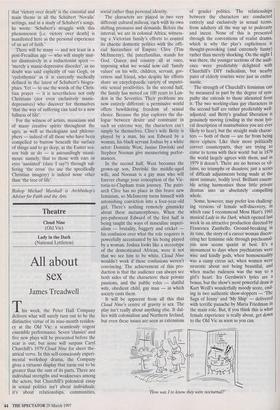Theatre
Lady in the Dark (National Lyttleton)
Cloud Nine (Old Vic)
All about sex
James Treadwell
This week, the Peter Hall Company delivers what will surely turn out to be the distinctive virtue of its nine-month residen- cy at the Old Vic: a seamlessly cogent ensemble performance. Seven 'classics' and five new plays will be presented before the year is out, but none will surpass Caryl Churchill's 1979 Cloud Nine for sheer the- atrical verve. In this self-consciously experi- mental workshop drama, the Company gives a virtuoso display that turns out to be greater than the sum of its parts. There are individual strengths and weaknesses among the actors, but Churchill's polemical essay in sexual politics isn't about individuals: it's about relationships, communities, social rather than personal identity.
The characters are placed in two very different cultural milieux, each with its own shifting pressures and demands. Before the interval, we are in colonial Africa, witness- ing a Victorian family's efforts to control its chaotic domestic politics with the offi- cial hierarchies of Empire. Clive (Tim McInnerny), the paterfamilias, stands for God, Queen and country all at once, imposing what we would now call 'family values' on his wife, children, servant, gov- erness and friend, who despite his efforts share an encyclopaedic variety of unpatri- otic sexual proclivities. In the second half, the family has moved on 100 years to Lon- don in the Seventies. Their problems are now entirely different: a permissive world offers bewildering freedom of sexual choice. Because the play explores the dia- logue between desire and constraint in such an extreme way, the characters can't simply be themselves. Clive's wife Betty is played by a man, his son Edward by a woman, his black servant Joshua by a white actor: Dominic West, Janine Duvitski and Stephen Noonan give mesmerising perfor- mances.
In the second half, West becomes the grown-up son, Duvitski the middle-aged wife, and Noonan is a gay man who will forever change your conception of the Vic- toria-to-Clapham train journey. The patri- arch Clive has no place in this brave new feminism, so McInnerny turns himself with astonishing conviction into a four-year-old girl. There's nothing remotely gimmicky about these metamorphoses. When the pre-pubescent Edward of the first half is being taught the ways of masculine imperi- alism — brutality, buggery and cricket — his confusion over what the role requires is powerfully accentuated by his being played by a woman. Joshua looks like a stereotype of the domesticated African, were it not that we see him to be white. Cloud Nine wouldn't work if these confusions weren't convincing. The achievement of this pro- duction is that the audience can always see both sides of the characters: their private passions, and the public roles — dutiful wife, obedient child, gay man — in which society casts them.
It will be apparent from all this that Cloud Nine's centre of gravity is sex. The play isn't really about anything else. It dal- lies with colonialism and Northern Ireland, but even these issues are seen as extensions of gender politics. The relationships between the characters are conducted entirely and exclusively in sexual terms, from adultery all the way up to pederasty and incest. None of this is presented through the conventions of realist drama, which is why the play's explicitness is thought-provoking (and extremely funny) rather than merely shocking. On the night I was there, the younger sections of the audi- ence were predictably delighted with Churchill's DIY radicalism, but nearby pairs of elderly tourists were just as enthu- siastic.
The strength of Churchill's feminism can be measured in part by the degree of sym- pathy she extends to those alienated from it. The two working-class gay characters in the second half are rather predictably well- adjusted, and Betty's gradual liberation is genuinely moving (ending in the most lyri- cal description of masturbation you are ever likely to hear), but the straight male charac- ters — both of them — are far from being mere ciphers. Like their more politically correct counterparts, they are trying to come to terms with their world: but in 1879 the world largely agrees with them, and in 1979 it doesn't. There are no heroes or vil- lains, no triumphs or disasters; just a series of difficult adjustments being made at the most intimate, bodily level. Brilliant ensem- ble acting harmonises these little private dramas into an absolutely compelling whole.
Some, however, may prefer less challeng- ing versions of female self-discovery, in which case I recommend Moss Hart's 1941 musical Lady in the Dark, which opened last week in an attractive production directed by Francesca Zambello. Ground-breaking in its time, the story of a career woman discov- ering her feminine side through psychoanal- ysis now seems quaint at best. It's a monument to days when psychiatrists were wise and kindly gods, when homosexuality was a camp circus act, when women were neurotic about not being beautiful, and when macho rudeness was the way to a girl's heart. Ira Gershwin's lyrics are a bonus, but the show's most powerful draw Is Kurt Weill's wonderfully moody score, end- ing in two authentic show-stoppers — 'The Saga of Jenny' and 'My Ship' — delivered with terrific panache by Maria Friedman in the main role. But, if you think this is what female experience is really about, get down to the Old Vic as soon as you can.
'How was I to know they were nocturnal?'


































































 Previous page
Previous page